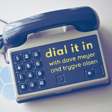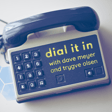
S3 Ep25: Business Insights from The Bezos Letters with Steve Anderson
In this episode of the Dial It In podcast, host Trygve reads a letter from Dave introducing Steve Anderson, an expert on business growth, risk, and innovation, who discusses his book, 'The Bezos Letters.' Anderson's book deconstructs Jeff Bezos' 21 shareholder letters to reveal Amazon's strategies for success. The conversation covers Amazon's approach to risk, customer obsession, innovative business practices, the importance of reducing friction in the customer journey, and how businesses can apply these principles to thrive. Anderson also highlights examples from other businesses like the Savannah Bananas and discusses the evolutionary journey and principles that have enabled Amazon to maintain its industry-leading position.
Buy Steve's Book
The Bezos Letters: 14 Principles to Grow Your Business Like Amazon
…
Dial It In Podcast is where we gather our favorite people together to share their advice on how to drive revenue, through storytelling and without the boring sales jargon. Our primary focus is marketing and sales for manufacturing and B2B service businesses, but we’ll cover topics across the entire spectrum of business. This isn’t a deep, naval-gazing show… we like to have lively chats that are fun, and full of useful insights. Brought to you by BizzyWeb.
Links:
Website: dialitinpodcast.com
BizzyWeb site: bizzyweb.com
Connect with Dave Meyer
Connect with Trygve Olsen

